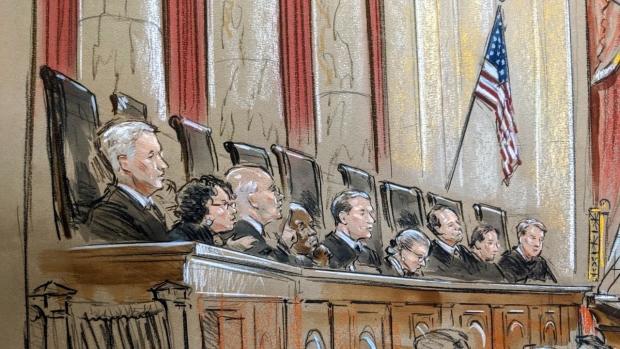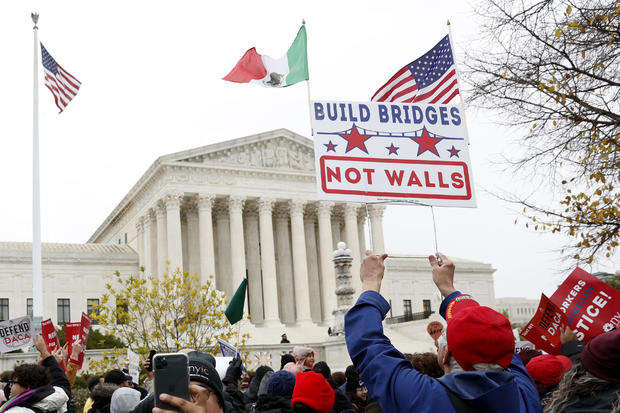Supreme Court's conservatives signal willingness to side with Trump in DACA case
Washington — The Supreme Court's conservative majority on Tuesday signaled a willingness to side with the Trump administration in the legal battle over the fate of a program shielding nearly 700,000 young undocumented immigrants from deportation, a move that would allow the Trump administration to end the Obama-era protections.
During highly anticipated oral arguments that lasted more than an hour, the high court's five conservative justices suggested in their questioning and deliberations that they would uphold the administration's controversial decision in the fall of 2017 to dismantle the Deferred Action for Childhood Arrivals program, known as DACA. The four liberal members of the court, meanwhile, expressed skepticism about the decision and the administration's shifting justifications for making it.
Former Homeland Security Secretary Janet Napolitano, who oversaw the creation of the DACA program in 2012, said she believes her side made a compelling argument to the justices.
"I think the arguments were well put. I think the court has a decision to make — that's their job. But I think that when all is said and done, they'll find that DACA, the decision, is reviewable," Napolitano told CBS News after the arguments. "And they'll find that the recission was wrong."
Inside the courtroom, Associate Justice Samuel Alito, who was nominated by Republican President George W. Bush, grilled Theodore Olson, one of two lawyers trying to convince the court to save DACA, over what type of justification the administration could make to lawfully terminate the program. Olson, who served as solicitor general under Bush, conceded the administration had the authority to end the protections, but said doing so required a "rational explanation," according to a transcript of the proceedings.
"That means the agency would have taken responsibility for making the consequences of those decisions, explaining why it thought about it and why it decided what to do," Olson argued, referring to the Department of Homeland Security, which oversees the protections for DACA recipients.
Chief Justice John Roberts, who has sided with the liberal justices in high-profile cases in the past, appeared to tell Michael Mongan, California's solicitor general who argued in favor of the program, that the administration had provided a sufficient explanation for ending DACA by citing the fate of a similar program that President Obama tried to establish in 2014.
In the summer of 2016, a 4-4 deadlock in the Supreme Court upheld a lower court ruling that declared that program — known as Deferred Action for Parents of Americans, or DAPA — unlawful, blocking it from going forward.
"You need more than that? You've got a court of appeals decision affirmed by an equally divided Supreme Court. Can't he just say that's the basis on which I'm making this decision?" Roberts asked Mongan.
Associate Justice Brett Kavanaugh, one of two justices President Trump has named to the court, said there was no reason to doubt former Homeland Security Secretary Kirstjen Nielsen made a "considered" case for ending the program in a June 2018 memorandum.
"This is a serious decision. We all agree with that," Kavanaugh said. "And it was for the secretary, presumably. And to say in writing, 'Even if it's lawful, I nonetheless am going to exercise my discretion,' I assume that was a very considered decision."
Justice Neil Gorsuch, the other justice nominated by Mr. Trump, appeared to agree with his fellow conservative jurists that the administration's public justifications for ending the protections of DACA recipients were sufficient. But he also expressed sympathy for those shielded by the program, known as "Dreamers."
"I hear a lot of facts, sympathetic facts," he said. "And they speak to all of us."
As usual, Justice Clarence Thomas, the fifth conservative on the court, did not speak during the proceedings.
Justices Sonia Sotomayor, Elena Kagan, Ruth Bader Ginsburg and Stephen Breyer — who make up the court's liberal minority — asked probing questions about the administration's shifting explanations for ending the program, pressing Solicitor General Noel Francisco, the government's top lawyer, on several occasions.
Sotomayor noted that Nielsen's June 2018 memorandum, which came in response to a federal judge who offered the administration a second chance to justify ending DACA, differed substantially from the original memorandum that then-Acting Homeland Security Secretary Elaine Duke issued to terminate the program in September 2017.
"I thought basic administrative law is, you look at what's first given to you — not what ... you add later," she said.
Sotomayor, the first Latina to serve on the nation's highest court, noted Mr. Trump said on multiple occasions he would look to find a way to allow DACA recipients to remain in the country.
"But assuming you ignore that and even look at the Nielsen memo, I think my colleagues have rightly pointed there's a whole lot of reliance interests that weren't looked at, including the ... current president telling DACA-eligible people that they were safe under him and that he would find a way to keep them here," Sotomayor added.
Francisco rested much of his argument on two contentions. The first was that the administration's decision to end DACA should not be second guessed by the courts. But if it were reviewable, he argued that the government believes it executed a "plainly and eminently reasonable rescission" of DACA that should pass legal muster.
But both Olson and Mongan strongly disputed Francisco's arguments, accusing the administration of relying on they viewed as the faulty notion that DACA was an unlawful exercise of presidential authority in order to avoid being held accountable for making a strictly political decision to end a popular program that benefits young immigrants who have lived in the U.S. for most of their lives.
The end of DACA, Olson said, "triggered abrupt, tangible, adverse consequences and substantial disruptions in the lives of 700,000 individuals, their families, employers, communities, and Armed Forces."
Sotomayor seemed to agree.
"Where is the political decision made clearly?" she asked Francisco. "That this is not about the law; this is about our choice to destroy lives."






